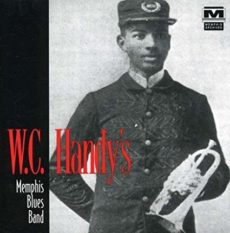
Daily Dose Of Jazz…
William Christopher Handy was born on November 16, 1873 in a log cabin built by his grandfather in Florence, Alabama. Because his father believed musical instruments were tools of the devil, he purchased his first guitar without his parents’ permission, that he secretly saved for by picking berries and nuts and making lye soap. Upon seeing the guitar his father ordered him to return it, but also arranged short-lived organ lessons, moving on to learn to play the cornet. Secretly he joined a local band, purchased a cornet from a fellow band member and spent every free minute practicing it.
After working for a time on a “shovel brigade” at the McNabb furnace, in 1892 Handy travelled to Birmingham, Alabama, passed a teaching exam and began teaching. Finding the compensation too little, he quit, got a job in a pipe plant, put together a small string orchestra and taught musicians how to read music. He later organized the Lauzetta Quartet, ventured to St. Louis, Missouri and founding working conditions deplorable, so they disbanded.
Handy would go on to Evansville, Indiana, play the cornet in the Chicago World’s Fair in 1893, join a successful band that performed throughout the neighboring cities and states and worked as a first tenor vocalist in a minstrel show, a band director, choral director, cornetist and trumpeter.
At the age of 23, he was the bandmaster of Mahara’s Colored Minstrels and over a three-year tour, they toured to Chicago, throughout Texas, Oklahoma, Tennessee, Georgia, Florida, Cuba and Alabama at the end. Weary of life on the road, he and his wife, Elizabeth, settled in his nearby hometown of Florence and he became a faculty member at Alabama and Mechanical University from 1900 to 1902.
W.C. traveled throughout Mississippi, listening to various styles of black popular music, and with his remarkable memory would recall and transcribe the music later. He rejoined the Mahara Minstrels, toured the Midwest and Pacific Northwest, and became the director of a black band in Clarksdale, Mississippi. By 1909 he and his band moved to Memphis, Tennessee, where the publication of his Memphis Blues sheet music introduced his style of 12-bar blues, credited as the inspiration for the foxtrot dance step. By the time he was 40, he had established his musical style, his popularity had greatly increased, he was a prolific composer and a successfully profitable music publisher.
He founded the Handy Record Company, gained widespread popularity with the Bessie Smith recording of his Saint Louis Blues with Louis Armstrong, published several books including an autobiography and went blind after a fall from a subway platform. He later suffered a stroke and on March 28, 1958, W. C. Handy, The Father of the Blues, passed away from bronchial pneumonia at Sydenham Hospital in New York City.
More Posts: cornet


